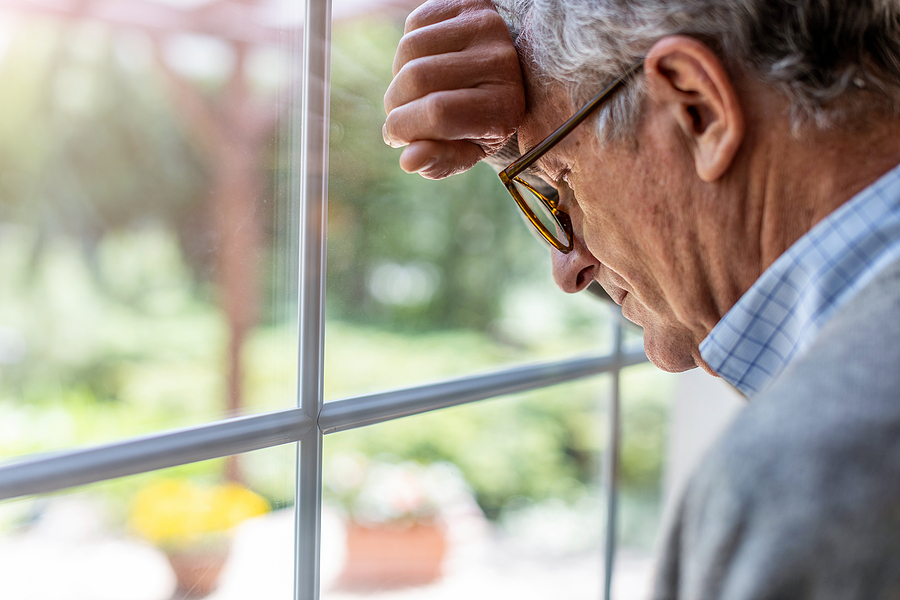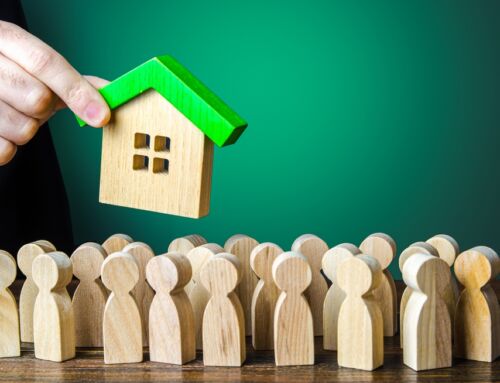If you’ve been feeling a little stressed lately, you’re far from alone. The COVID-19 crisis has created elevated anxiety levels for many people. People can experience feelings of anxiety in a number of ways, but it is often described as feeling worried, nervous, irritable, or “on edge.” Some people with anxiety feel a sense of impending danger, panic, or doom; others may have difficulty concentrating or have trouble sleeping. There are also more physical symptoms that can be associated with anxiety such as:
- An increased heart rate
- Breathing rapidly, unusual sweating, and/or trembling
- Feeling weak or tired
- Gastrointestinal (GI)/stomach problems
- Changes in eating patterns (eating too much or too little)
- Increased alcohol, tobacco, or drug use
There’s concrete evidence that more people are experiencing anxiety symptoms these days. According to a survey conducted in March by the American Psychiatric Association (APA), nearly half of Americans (48 percent) were worried about the possibility of getting coronavirus, and 40 percent were anxious about becoming seriously ill or dying from it. Interestingly, nearly two-thirds (62 percent) of survey respondents said they were worried about the possibility of a loved one getting the virus.
But people’s concerns extend well beyond just health right now as so many face job losses, social isolation, food insecurity, and more. The Household Pulse Survey conducted by the National Center for Health Statistics (NCHS) and the Census Bureau in April/May found that, among 42,000 adult respondents, 30 percent said they were experiencing symptoms of an anxiety disorder, and a quarter (24 percent) had symptoms of a depressive disorder as a result of the pandemic.
>> Related: A Sense of Wellbeing Leads to a Longer Life: How CCRCs Can Help
Seniors not reporting anxiety symptoms?
When broken down by age demographic, however, these Pulse Survey results reveal an unusual trend. Interestingly — or perhaps concerningly — while seniors are more at risk of having serious complications if they get the coronavirus, only 11 percent of Pulse Survey respondents ages 80 and older reported symptoms of anxiety, and only 9 percent reported depression symptoms. This is substantially lower than the rates reported by the overall adult population in this same survey.
There is no doubt that these are stressful times for many people, so why these disproportionately low anxiety numbers among seniors? While some research suggests that older adults are generally happier than those in, say, their mid-forties, other studies have shown that seniors do in fact experience anxiety with the same prevalence as other adult age groups.
Researchers have theorized that this discrepancy in the Pulse Survey may be the result of seniors being less willing to admit to researchers or healthcare providers that they are struggling with anxiety or other mental health symptoms. As a result of this lack of self-reporting by many seniors, anxiety issues are not accurately diagnosed or treated as frequently among seniors as in younger populations.
>> Related: Seniors’ Relationship with Their Primary Care Doctor is Key
Getting past mental health stigmas
We have all known people who were “worriers” — people who seemed to always fret about the “what ifs” of life. It is easy to discount such concerns: “That’s just Grandpa’s nature” or “Mom has always been a nervous Nelly.” We all go through stressful periods in our lives, but when worries become so frequent that they are disruptive to living your life, it’s time to make some changes and possibly consider professional help.
There have been longstanding stigmas around seeking care for mental health issues, especially among certain genders and generations of people. In their youth, many older people were taught to be stoic — that showing emotions was a sign of weakness — that anxiety, depression, and even post-traumatic stress disorder (PTSD) are “all in your head…just get over it.”
But we now understand that anxiety and other mental health conditions are not something to discount or ignore, and when we know better, we can do better.
For example, we now know that anxiety impacts seniors differently than younger people, and some older people can be at even higher risk for experiencing unhealthy levels of anxiety. They may suffer the loss of more friends and loved ones, or they may have to endure a chronic health condition, both of which can lead to anxiety. Anxiety is also prevalent among people with dementia, such as Alzheimer’s disease.
We also now recognize that just like diabetes or high blood pressure, anxiety is a health condition, and your mental health is just as important as your physical health. The good news is that also like diabetes and high blood pressure, there are lifestyle changes you can implement to decrease your anxiety symptoms, and there are also other treatments that can help, such as counseling or even medication in certain cases.
>> Related: Research Continues to Find Benefits of Retirement Communities
Simple ways to help reduce anxiety
The CDC recommends several healthy tactics to help deal with stress and anxiety more effectively in the current environment.
- Know what to do if you are sick or are concerned about getting COVID-19. Contact a health professional before you start any self-treatment for COVID-19.
- Know where and how to get treatment and other support services and resources, including counseling or therapy (in person or through telehealth services).
- Take care of your emotional health. This will help you think clearly and react to the urgent needs to protect yourself and your family.
- Take breaks from watching, reading, or listening to news stories, including those on social media. Hearing about the pandemic repeatedly can be upsetting.
- Take care of your body.
- Take deep breaths, stretch, or meditate.
- Try to eat healthy, well-balanced meals.
- Exercise regularly.
- Get plenty of sleep.
- Avoid excessive alcohol and drug use.
- Make time to unwind. Try to do some other activities you enjoy like cooking, reading, or listening to music.
- Connect with others. Talk with people you trust about your concerns and how you are feeling.
- Connect with your community- or faith-based organizations. While social distancing measures are in place, consider connecting online, through social media, or by phone or mail.
>> Related: Senior Wellness Programs: Good for CCRC Residents & The Bottom Line
Don’t suffer in silence
If you try these tips and are still struggling with stress and anxiety, it is important to share your concerns with your doctor. They might advise you of other changes you can make in your lifestyle, or they may suggest medication that can help. There’s no need to suffer in silence when help is available, and addressing your anxiety symptoms can substantially improve your quality (and even quantity) of life.






